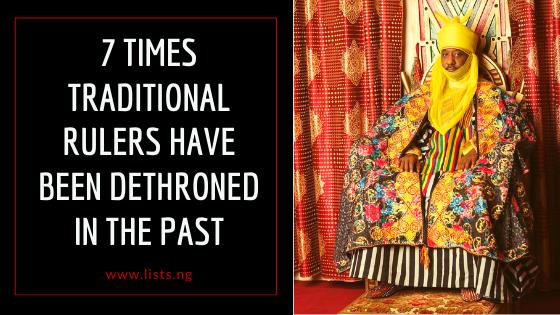In a what was an interesting turn of events, the Kano state Government announced that Emir of Kano, Muhammadu Sanusi II had been removed from his throne and subsequently replaced by Alhaji Aminu Ado Bayero. This development raised the question of how much power traditional leaders really have, and if it was appropriate for a governor to remove an Emir. Some even claimed that such incidents can never occur in other parts of the country because of the power that their traditional rulers hold.
In truth, the status of these traditional leaders is near impeccable, but as history informs us, they can very much be dethroned as absolute power is never really guaranteed. Throughout the history of Nigeria, several powerful rulers have been removed from their positions, not just by colonialists, but by rivals and even the people they rule.
Here is a list of traditional rulers in Nigeria that have faced dethronement and exile by their indigenous people.
Oba Akitoye (Oba of Lagos)
Oba Akitoye ascended the throne as Oba of Lagos in 1841 and tried to ban slave trading. This did not bode well with merchants, who were prominent slave traders, they vehemently opposed Oba Akitoye’s move. More so, much to the disapproval of the chiefs, Akitoye sought to reconcile with his nephew, Kosoko. This reconciliation attempt turned awry, as Kosoko sought to claim the Obaship for himself. The tensions led to an uprising named Ogun Olomiro (Salt Water War) by the Kosoko faction in July 1845. The Kosoko faction laid siege to the Oba’s Palace for three weeks. Akitoye eventually accepted defeat, escaped up the lagoon to the north, and was granted safe passage through the Agboyi Creek by Oshodi Tapa, Kosoko’s war captain. Akitoye thereafter arrived in Abeokuta where he was granted asylum. Kosoko ascended the throne and became the Oba of Lagos.
Oba Adeniran Adeyemi (Alaafin of Oyo)
Oba Adeniran Adeyemi succeeded Siyanbola Ladigbolu I as Alaafin of Oyo in 1945 and reigned as Alaafin until 1954 when he was sent on exile by the Western Region Government for sympathizing with opposition NCNC, and for his conflict with Bode Thomas who was Deputy Leader of the Action Group. Adeyemi was sent on exile to Ilesha and later relocated to Egerton Street on Lagos Island where he stayed till his death in 1960.
Olateru Olagbegi II (Olowo of Owo)
Sir Olateru Olagbegi II reigned as Olowo of Owo from 1941 to 1966 before he was dethroned. Oba Olateru’s dethronement and exile, came as a result of the fall out of the Western Regional crisis which fractionalized the Action Group into- Awolowo and Akintola camps in 1962. Oba Olateru went in the direction of Akintola while his former ally and disciple, Michael Adekunle Ajasin, who had become prominent, stood in support of Awolowo. This difference in political views made the once best friends, sworn enemies. In January 1966, some members of the Owo Community began to organize persistent revolts, riots, against Oba Olateru, leading to his suspension in June 1966. Olateru made an attempt to retake the throne on February 8, 1968, but that was met with fierce resistance which led to destruction of properties. This led to permanent dethronement by the military government of Gen. Adeyinka Adebayo, who also sent him on exile to Okitipupa.
Oba Oluwadare Adepoju Adesina (Deji of Akure)
In June 2010, Oba Oluwadare Adepoju Adesina, Deji of Akure, was deposed by the Ondo State Government in June 2010, for beating his wife-Olori Bolanle Adepoju Adesina in public. It was reported that Oba Oluwardare poured an unknown substance on his wife and ordered his guards to whip her. As a result of this act, viewed as a complete desecration of the Royal Stool of the Deji of Akure, the kingmakers of Akure, declaring him unworthy of the throne and the seat vacant. He was subsequently succeeded by Deji Adebiyi Adegboye Adesida-Afunbiowu III
Ibrahim Dasuki (Sultan of Sokoto)
On 6 December 1988, Ibrahim Dasuki succeeded Abubakar Siddique as the new Sultan to the dismay of some in Sokoto. The announcement led to five days of rioting in which 10 people died. He was considered a modernist against the wishes of some who wanted the traditionalist candidate, Maccido. Sultan Dasuki tried to endear himself to the Sokoto populace by building 10 Quaranic schools in 1990 and establishing an adult literacy class. He also tried to unite the Muslim ummah through the reorganization of Jama’atu Nasril Islam and the Nigerian Supreme Council of Islamic Affairs (NSCIA). He gave impetus to the appointment of Lateef Adegbite, who became the first Yoruba secretary general of NSCIA. Despite all his efforts, he never really had a peaceful and successful reign.
In 1996, Dasuki was called into the office of the military administrator of Sokoto, Yakubu Muazu and was told he was deposed as the Sultan. He was flown to Yola and then taken to Jalingo where he was placed in exile. Muazu gave some reasons for the banishment such as Dasuki was causing enmity among the people and among the royal family, ignoring government directives and traveling outside his domain without approval or notice from the government.
Emir Sir Muhammadu Sanusi I (Emir of Kano)
Grand father of the just deposed Emir of Kano, Emir Sir Muhammadu Sanusi I, KBE was the Emir of Kano from 1954-1963 until his dethronement. He was the eldest son of Emir Abdullahi Bayero and once held the title of Ciroma Kano. He was a powerful Emir that had substantial influence in the colonial Northern Nigeria, hosting Queen Elizabeth II when she visited Kano in 1956. However, the power tussle between him and his distant cousin Sir Ahmadu Bello the Sardauna of Sokoto is believed to have resulted in his dethronement and confinement in Azare 1963.
Oba Oladapo Samuel Ademola II (Alake of Egba land)
Oba Oladapo Samuel Ademola II, ruled as the Alake of Egba land for 42 years, but that reign was marred by two years of exile, between 1948 to December 1950, imposed on him by the Women’s Union, led by Mrs. Funmilayo Ransome Kuti. This group of women, numbering over 20000 campaigned vigorously against abnormal taxes and price control. The rigorous campaign eventually they chased Oba ademola out of the Palace, condemning him to exile on the threat of castration and this resulted in the king’s abdication.






